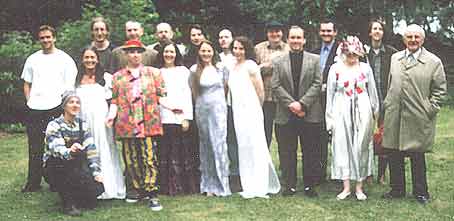
| HOME |
| NERVE |
| REVIEWS |
| ARCHIVE |
| EVENTS |
| LINKS |
| ABOUT US |
| CONTRIBUTORS |
| BACK ISSUES |
| CONTACT US |
Making your own theatre
By Joe Scott
 ‘for
the first couple of months it was just four people, sitting there wondering
if we’d made a wise move. By spring we had enough people to put
our first show on’ Ged Quayle
‘for
the first couple of months it was just four people, sitting there wondering
if we’d made a wise move. By spring we had enough people to put
our first show on’ Ged Quayle
There are some genuinely excellent
theatre projects in and around Liverpool. Started often with no money
and little support some of them have developed into large and successful
companies. Nerve speaks to Network Theatre Group, to find out how it can
be done.
The Network has just finished a sell out run of Ibsen’s “A
Doll’s House” at the Unity, they’re producing a first
play by a local playwright in April, and they’re about to launch
into the third of their successful “Shakespeare in the Park”
projects. At the same time they’ve taught theatre skills to campaigning
groups, hosted classes on Theatre of the Oppressed and are launching a
political cabaret project. Everyone in the Network is a volunteer, and
membership is available to anyone. As a grassroots arts project Network
is hugely successful.
Technically the Network started in 1987 after the closure of the Merseyside
Unity Theatre, but by 2000 it had fallen defunct. It was only the determination
of one man, Graham Frood, that kept the name alive. In 2000 a bunch of
people joined determined to develop it. The Network you see today is barely
3 years old.
Founder member Ged Quayle remembers: “for
the first couple of months it was just four people, sitting there wondering
if we’d made a wise move. By spring we had enough people to put
our first show on, by spring the following year there were enough people
to cast the first Shakespeare in the Park. The Network now has about 50
full members. It was hard work but we’re getting there.”
Getting the Network started was difficult but probably no different to
any community or arts project. Ged advises: “You really just have
to be persistent. People have to get used to seeing you and they have
to be convinced that you’re for real. It took a couple of months
of just turning up, plugging away before things finally started to take
off for the Network and it’s probably no different for any other
project. Persistence is essential. Persistence and performance; the Network
set a target of producing plays very early on and we’ve stuck to
that. Whatever the Network does the Network will produce plays. That keeps
it focused on goals. Experience has been that you’ve got to have
goals or the whole thing just drifts along and people get demotivated.”
 Network
arranges theatre visits. Their philosophy is that if you want to make
theatre then seeing theatre is essential. They’ve arranged visits
all around the country and encouraged people to visit theatres. Making
it a social event is important as well; it can be a bit flat going on
your own. Going in a group is just more fun for people.
Network
arranges theatre visits. Their philosophy is that if you want to make
theatre then seeing theatre is essential. They’ve arranged visits
all around the country and encouraged people to visit theatres. Making
it a social event is important as well; it can be a bit flat going on
your own. Going in a group is just more fun for people.
The Network’s philosophy is to be useful, to be open, to be equal; anyone can turn up, anyone can have a go, anyone can audition or suggest a project. Asked about future plans, Ged says: “Really we’re set on encouraging participation. In ten years time I’d like there to be theatre groups working all over Liverpool. I’d like to pick up this magazine, say, and be spoiled for choice by the number of shows going on and know that the Network had a part in encouraging that.”
If you’re thinking of starting a group then Ged’s advice is start, persist and commit yourself to production. If you get stuck or need advice you’re welcome to talk to the Network, they’re in the Flying Picket on Hardman St every Tuesday at 7pm or you can look on their website: